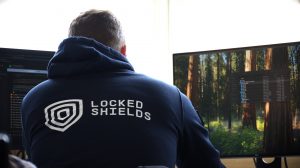Perfectly preparing for cyberattacks? It's almost impossible. But the large-scale NATO exercise Locked Shields simulates a realistic scenario with problems and a context that is very close to reality. More than 4,000 people from no less than 41 different countries participated in the training.
e-BO Enterprises was invited by the Belgian Cyber Command of Defense to be part of the team. Belgium, together with Latvia and Luxembourg, formed a defensive blue team of 260 people who were subjected to cyberattacks for four days. This gave them the opportunity to further optimize the various cyber capabilities that the Cyber Command of ADIV has.

"The exercise requires months of preparation. Even then, you can't be ready for what awaits us in the coming days," said one of the participants at the start of the exercise. During Locked Shields, organized by the NATO Cooperative Cyber Defence Centre of Excellence (CCDCOE), various teams worldwide are simultaneously subjected to a large-scale cyberattack.
17 blue teams were tasked with protecting a fictional country, 'Berylia', from realistic cyberattacks by the red team. The better a blue team defends 'Berylia', the more points it earns. There are also green, yellow, and white teams, neutral teams that set up the scenario and simulate normal network usage.
e-BO Enterprises was part of the international blue team Belgium-Luxembourg-Latvia, and achieved 4th place out of 17 blue teams. That is quite an achievement, given the difficulty of the exercise. A participant proudly said after the exercise: "Our team delivered a great performance. I saw myself and the team grow during the exercise, and we were also able to develop great partnerships. Locked Shields 2025 was definitely a success!"

"Train as you fight"
We hear more and more about cyberattacks being carried out on crucial systems. For example, energy distribution, satellite, and 5G communication. The systems must remain operational, and access for users must be maintained during these attacks. A member of the reporting team testifies that it requires a lot of coordination: "Our own blue team consists of 19 sub-teams to keep everything under control. We have teams that investigate where the attacks come from and then combat them, teams that monitor, write legal advice, follow up on media, and much more. Communication between the different teams is crucial, but also the biggest challenge to be successful."
Participants build experience on how to respond in a war situation and the necessary speed with which to react and decide. Everyone is pushed to the limit, which is what Locked Shields is all about.
"For me, it is important that participants not only gain knowledge and expertise to deal with such situations in the future but also meet peers, expand their network, and thus lay the foundation for long-term collaborations and partnerships across borders," said one of the organizers.



